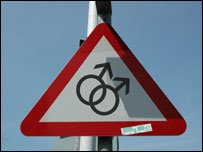While I was quietly web-surfing and becoming lost in one of several trains-of-thought, I came across a wikipedia article describing the wonderful field of ecolinguistics.
Have we finally reached a new level of ridiculosity? This sub-field of linguistics frames itself as the earth-friendly version of linguistics.
Here's a sample of what one self-proclaimed ecolinguistic describes the field as:
Ecolinguistics is a new branch of linguistics which investigates the role of language in the development and possible solution of ecological and environmental problems. For this, some ecolinguists use the concept of the eco-system metaphorically for language world systems which they analyse with the help of concepts transferred from biological ecology.
Ecolinguists criticize language on the levels of langue and parole and point out unecological language uses and "anthropocentrisms" which represent nature from the point of view of its usefulness for humans. In a wider understanding, the "growthism", "sexism", "classism" and "anthropocentrism" inherent in many languages and language uses are criticized.
Another important field of ecolinguistics is the research area of the relation between linguistic and biological diversity (two phenomena ecolinguists aim to preserve).
(Emphasis added by me).
This approach to linguistics is ultimately based on Micheal Holliday's research in the early 90's. Which criticized English-speaker's positive attitude towards unmarked terms such as "large", "grow", "tall", etc. and how these terms have a positive aspect, even if they undermine our surrounding environment when used to describe "economic growth".
The laughable things about this approach: these "un-marked terms" don't go without descriptors here in the real-world of syntax. For example, I can say "large amount of pollution" and suddenly "large" in that phrase has a certainly negative aspect.
You don't have to be a linguist to understand that how you frame a concept with language can influence how your readers interpret the information you're trying to convey. We don't need an entire sub-field so narrowly devoted to this subject.
In my own humble opinion, these are tree-huggers who play at being grammarians on the side.
The fact is, every creature on earth uses other creatures and the environment for its own needs. There's nothing wrong with this. This very web of usefulness creates the elegant inter dependencies we observe in the environment.
The very fact that this field of linguistics openly assigns moralistic values to its analysis of language makes this field USELESS.
My ultimate point is: ecolinguistics doesn't treat the cause of materialism, which often drives the destruction of the environment, it only points out the symptoms of materialism.
Thursday, December 13, 2007
Ecolinguistics
Subscribe to:
Post Comments (Atom)





No comments:
Post a Comment